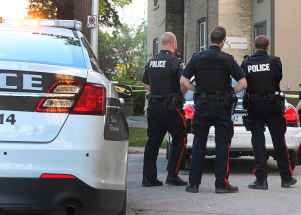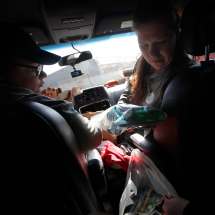Crime stats to tell dark tale of the city
Read this article for free:
or
Already have an account? Log in here »
To continue reading, please subscribe:
Monthly Digital Subscription
$0 for the first 4 weeks*
- Enjoy unlimited reading on winnipegfreepress.com
- Read the E-Edition, our digital replica newspaper
- Access News Break, our award-winning app
- Play interactive puzzles
*No charge for 4 weeks then price increases to the regular rate of $19.00 plus GST every four weeks. Offer available to new and qualified returning subscribers only. Cancel any time.
Monthly Digital Subscription
$4.75/week*
- Enjoy unlimited reading on winnipegfreepress.com
- Read the E-Edition, our digital replica newspaper
- Access News Break, our award-winning app
- Play interactive puzzles
*Billed as $19 plus GST every four weeks. Cancel any time.
To continue reading, please subscribe:
Add Free Press access to your Brandon Sun subscription for only an additional
$1 for the first 4 weeks*
*Your next subscription payment will increase by $1.00 and you will be charged $16.99 plus GST for four weeks. After four weeks, your payment will increase to $23.99 plus GST every four weeks.
Read unlimited articles for free today:
or
Already have an account? Log in here »
Hey there, time traveller!
This article was published 19/07/2019 (2335 days ago), so information in it may no longer be current.
The numbers won’t be pretty when Winnipeg Police Service Chief Danny Smyth releases the city’s official crime statistics for 2018.
Preliminary figures for November 2017 to October 2018 show violent crime increased 17 per cent, compared with the same period a year earlier. Property crimes soared 40 per cent during that time.
Winnipeg police publish monthly crime statistics on their website that cover a 12-month rolling period. The numbers are compared with the same 12-month period a year earlier.
They’re not the official crime statistics; those are published by calendar year in the WPS annual report, which Smyth is scheduled to unveil Monday.
However, the monthly online data gives us a good idea of crime in Winnipeg — and it isn’t looking good.

!function(e,t,s,i){var n=”InfogramEmbeds”,o=e.getElementsByTagName(“script”)[0],d=/^http:/.test(e.location)?”http:”:”https:”;if(/^/{2}/.test(i)&&(i=d+i),window[n]&&window[n].initialized)window[n].process&&window[n].process();else if(!e.getElementById(s)){var r=e.createElement(“script”);r.async=1,r.id=s,r.src=i,o.parentNode.insertBefore(r,o)}}(document,0,”infogram-async”,”https://e.infogram.com/js/dist/embed-loader-min.js”);
It appears violent crime per capita has grown for the fourth year in a row. That’s bad news for a city that regularly scores at the top of Statistics Canada’s violent crime severity index.
Assaults were up last year, including a 29 per cent increase in assaults against peace officers. Robberies soared 32 per cent, and there was an increase in sexual assaults.
Homicides, which tend to fluctuate from year to year, were down. In 2019, they’re on pace to reach a record level.
Police also publish quarterly crime stats online. That data shows violent crime fell five per cent in 2018, but it also says December 2018 numbers are understated and will be “considerably higher” when the official figures are released. The quarterly report shows property crimes up 23 per cent for 2018.
Either way, violent crime has taken a foothold in Winnipeg, after several years of decline prior to 2014. Violent crime was well above the five-year average last year, and it’s showing no signs of letting up.
The city’s illicit drug problem, particularly the increased use of methamphetamine, is driving the latest crime wave. It’s causing drug users to behave erratically and often violently. It’s making Winnipeg streets more dangerous. It’s putting the entire community at risk.
What Smyth will tell Winnipeggers Monday — as he has for the past two years — is the city’s illicit drug problem, particularly the increased use of methamphetamine, is driving the latest crime wave. It’s causing drug users to behave erratically and often violently. It’s making Winnipeg streets more dangerous. It’s putting the entire community at risk.
Smyth has already called out elected officials for dragging their feet. Governments, particularly the province, have not responded with the level of urgency required to tackle the meth issue, he said. There are many options on the table for enhanced treatment and prevention, but government has been slow to act on them, he said.
Smyth is expected to say more Monday, including how it’s affecting police officers, their workload and morale. The police chief doesn’t pick many public battles, so when he does speak out, government would be well-advised to pay attention.
Meanwhile, the Pallister government continues to hide behind its self-imposed, pre-election blackout period to explain why it’s not taking further action on the meth crisis. Government claims the Election Financing Act prevents it from doing so, but that’s not entirely accurate.
There is no legislated ban on government advertising right now. The 90-day restriction only applies in the lead-up to a fixed-date election, which was scheduled for Oct. 6, 2020; Premier Brian Pallister has unofficially called an early election for Sept. 10.
The ban doesn’t apply when an early election is called. The current restrictions announced by the premier are voluntary. They’re not mandated by law.

Even if government is attempting to follow the spirit of the legislation by imposing a blackout, it doesn’t apply to public health issues. That’s one of the exceptions in the act.
Government can advertise or publish information about its activities if it’s “required at the time” and if it “relates to important matters of public health or safety.”
Swift action by government to combat the illicit drug trade is definitely required at this time. And the meth crisis is most certainly a public health and safety issue.
Which means there’s nothing stopping the province from immediately freeing up funds to expand treatment programs and to implement other options that have been recommended by experts in the field.
Perhaps the Winnipeg police chief could remind government of that Monday, when he takes this fight to the next level.
tom.brodbeck@freepress.mb.ca

Tom Brodbeck is an award-winning author and columnist with over 30 years experience in print media. He joined the Free Press in 2019. Born and raised in Montreal, Tom graduated from the University of Manitoba in 1993 with a Bachelor of Arts degree in economics and commerce. Read more about Tom.
Tom provides commentary and analysis on political and related issues at the municipal, provincial and federal level. His columns are built on research and coverage of local events. The Free Press’s editing team reviews Tom’s columns before they are posted online or published in print – part of the Free Press’s tradition, since 1872, of producing reliable independent journalism. Read more about Free Press’s history and mandate, and learn how our newsroom operates.
Our newsroom depends on a growing audience of readers to power our journalism. If you are not a paid reader, please consider becoming a subscriber.
Our newsroom depends on its audience of readers to power our journalism. Thank you for your support.















